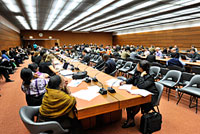Featured Update
High Commissioner: Crucial role of civil society in the implementation of anti-racism conference outcome

More than 300 civil society organizations are participating at the Durban Review Conference and played a crucial role in the preparatory process. Photo credit: UN Photo/ Pierre Virot.
High Commissioner for Human Rights Navi Pillay on 22 April called on civil society to join hands in ensuring that the final outcome document of the anti-racism Durban Review Conference produces concrete results on the ground.
The third day of the Review Conference heard statements from representatives of governments, United Nations agencies, international and regional organizations, UN human rights treaty bodies and independent experts, and national human rights institutions.
High Commissioner Pillay, who is Secretary-General of the Review Conference, on Wednesday engaged in a dynamic question-and-answer meeting with over 200 members of civil society on the sidelines of the Conference.
"Let me reiterate that we are at the beginning of the implementation process, not at the end. Your expertise and monitoring role will continue to be part and parcel of effective implementation strategies," Pillay told representatives of non-governmental organizations (NGOs) at the meeting.
"You have your hands on the pulse of the communities you come from. Your involvement is indispensible to produce concrete results on the ground where it matters the most."
The High Commissioner pointed out that civil society had provided input to the outcome document throughout the 3-year preparatory process. It can continue to have a permanent entry-point in its implementation process through the follow up mechanisms established by the 2001 Durban Declaration and Programme of Action.
"Civil society’s expertise is not only crucial to enhance work at the technical level, but also to influence the longer-term aspects of the implementation work," she said.
"The diversity of civil society groups, as well as individuals, participating in this Review Conference attests to the fact that racism, discrimination, xenophobia are widely shared and pressing concerns.
"In your line of work, I am sure, many of you are experiencing the urgency of fighting discrimination in all its old and new forms, particularly now that the economic conditions in both poor and rich countries have the potential of pitting communities against one another," Pillay said.
The High Commissioner said the speedy adoption by consensus of the Review Conference’s final outcome document on 21 April vindicated the trust she and many others put in the process.
She called on civil society, governments, international organizations and others to join hands and make the best use of available energies and resources to "help create a world of equal opportunity and treatment for all of us, or at the very least for our children, and our children’s children."
The Review Conference, which runs from 20 to 24 April, assesses progress made since the 2001 World Conference against Racism, Racial Discrimination, Xenophobia and Related Intolerance held in Durban, South Africa.
Over 4700 participants have registered to take part in the Conference, among them over 1000 representatives of more than 300 NGOs.
Top